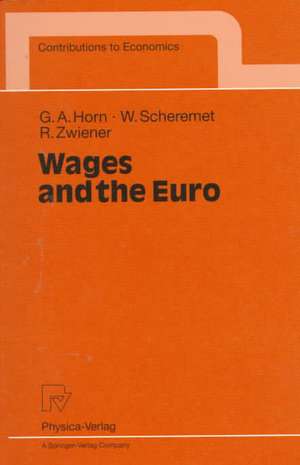Wages and the Euro: Contributions to Economics
Autor Gustav A. Horn, Wolfgang Scheremet, Rudolf Zwieneren Limba Engleză Paperback – 15 apr 1999
Din seria Contributions to Economics
- 18%
 Preț: 1001.81 lei
Preț: 1001.81 lei -
 Preț: 90.83 lei
Preț: 90.83 lei - 15%
 Preț: 649.06 lei
Preț: 649.06 lei - 18%
 Preț: 1109.92 lei
Preț: 1109.92 lei - 24%
 Preț: 657.09 lei
Preț: 657.09 lei - 18%
 Preț: 976.54 lei
Preț: 976.54 lei - 17%
 Preț: 361.03 lei
Preț: 361.03 lei - 18%
 Preț: 1027.83 lei
Preț: 1027.83 lei -
 Preț: 283.93 lei
Preț: 283.93 lei - 15%
 Preț: 644.95 lei
Preț: 644.95 lei - 15%
 Preț: 638.24 lei
Preț: 638.24 lei -
 Preț: 394.29 lei
Preț: 394.29 lei - 15%
 Preț: 636.80 lei
Preț: 636.80 lei - 15%
 Preț: 637.78 lei
Preț: 637.78 lei - 18%
 Preț: 723.69 lei
Preț: 723.69 lei - 15%
 Preț: 635.47 lei
Preț: 635.47 lei - 15%
 Preț: 634.00 lei
Preț: 634.00 lei -
 Preț: 392.75 lei
Preț: 392.75 lei -
 Preț: 383.33 lei
Preț: 383.33 lei - 15%
 Preț: 637.28 lei
Preț: 637.28 lei - 15%
 Preț: 636.80 lei
Preț: 636.80 lei - 18%
 Preț: 950.96 lei
Preț: 950.96 lei - 15%
 Preț: 634.68 lei
Preț: 634.68 lei -
 Preț: 387.38 lei
Preț: 387.38 lei - 15%
 Preț: 647.27 lei
Preț: 647.27 lei - 15%
 Preț: 636.63 lei
Preț: 636.63 lei - 15%
 Preț: 639.73 lei
Preț: 639.73 lei -
 Preț: 385.62 lei
Preț: 385.62 lei - 15%
 Preț: 641.85 lei
Preț: 641.85 lei - 20%
 Preț: 649.60 lei
Preț: 649.60 lei - 15%
 Preț: 641.71 lei
Preț: 641.71 lei -
 Preț: 387.96 lei
Preț: 387.96 lei - 15%
 Preț: 645.47 lei
Preț: 645.47 lei -
 Preț: 385.08 lei
Preț: 385.08 lei - 15%
 Preț: 646.62 lei
Preț: 646.62 lei -
 Preț: 383.33 lei
Preț: 383.33 lei - 15%
 Preț: 638.43 lei
Preț: 638.43 lei -
 Preț: 381.21 lei
Preț: 381.21 lei - 15%
 Preț: 642.51 lei
Preț: 642.51 lei - 15%
 Preț: 637.78 lei
Preț: 637.78 lei - 15%
 Preț: 641.71 lei
Preț: 641.71 lei -
 Preț: 384.70 lei
Preț: 384.70 lei -
 Preț: 379.86 lei
Preț: 379.86 lei -
 Preț: 378.34 lei
Preț: 378.34 lei -
 Preț: 384.70 lei
Preț: 384.70 lei -
 Preț: 388.52 lei
Preț: 388.52 lei - 15%
 Preț: 641.71 lei
Preț: 641.71 lei -
 Preț: 381.00 lei
Preț: 381.00 lei - 15%
 Preț: 644.95 lei
Preț: 644.95 lei -
 Preț: 386.00 lei
Preț: 386.00 lei
Preț: 634.32 lei
Preț vechi: 746.26 lei
-15% Nou
Puncte Express: 951
Preț estimativ în valută:
121.42€ • 131.93$ • 102.05£
121.42€ • 131.93$ • 102.05£
Carte tipărită la comandă
Livrare economică 21 aprilie-05 mai
Preluare comenzi: 021 569.72.76
Specificații
ISBN-13: 9783790811995
ISBN-10: 3790811998
Pagini: 160
Ilustrații: XII, 143 p.
Dimensiuni: 155 x 235 x 8 mm
Greutate: 0.25 kg
Ediția:Softcover reprint of the original 1st ed. 1999
Editura: Physica-Verlag HD
Colecția Physica
Seria Contributions to Economics
Locul publicării:Heidelberg, Germany
ISBN-10: 3790811998
Pagini: 160
Ilustrații: XII, 143 p.
Dimensiuni: 155 x 235 x 8 mm
Greutate: 0.25 kg
Ediția:Softcover reprint of the original 1st ed. 1999
Editura: Physica-Verlag HD
Colecția Physica
Seria Contributions to Economics
Locul publicării:Heidelberg, Germany
Public țintă
ResearchCuprins
1 Economic Policy in Wake of Monetary Union.- 2 An Economic Policy Framework for European Monetary Union.- 2.1 Some Preliminary Theoretical Considerations.- 2.2 The Function of Exchange Rates.- 2.3 Monetary Policy in a Single Currency Area.- 2.4 Fiscal Policy after the Beginning of Monetary Union.- 3 The Role of Wage Policy after the Introduction of Monetary Union.- 3.1 Wage Development and Convergence in the Run-Up to Monetary Union.- 3.2 Wage Negotiation Systems in Europe.- 3.3 Labour Market Flexibility in a Common Currency Area.- 3.4 Institutional Conditions for an European Wage Policy.- 3.5 Non-Wage-Related Competitive Elements.- 3.6 Wage Policy in a Common Currency Area.- 4 Simulations on the Future Development for the European Labour Market.- 4.1 The Model and its Modifications.- 4.2 The Structure of the Simulation.- 4.3 The Effects of Monetary Union.- 4.4 Nominal Wage Decreases.- 4.5 Real Wage Decreases.- 4.6 Transforming the Social Security Systems.- 4.7 Productivity-Oriented Wage Formation.- 4.8 Reacting to Shocks.- 5 Conclusions and Economic Policy Recommendations.- References.
Textul de pe ultima copertă
With the abolition of exchange rates the role of wage formation in the European Monetary Union changes fundamentally and national economic policy in particular fiscal policy faces new restrictions. These are analysed in the first two chapters. A major impact is expected for wage formation. To achieve a convergence of economic developments wage finding has to follow in all EMU member countries basically the same rules. An empirical investigation using econometric methods show that this is presently not yet the case. In particular in the southern European countries wage finding is different from that in the rest of the EMU. Frequently the introduction of Euro is perceived as a signal to lower wages all over Europe to overcome the dismal employment situation. The book addresses the question whether such a race for lower wages is appropriate in terms of employment creation. Theoretical considerations as well as simulations on an econometric multi country model lead to the conclusion that to enhance growth and employment a productivity oriented wage strategy is advisable, a strategy already followed in particular in Austria, the Netherlands and Germany. In this case distorting changes of competitiveness not based on innovative successes are avoided and at the same time domestic European demand is stabilised.













